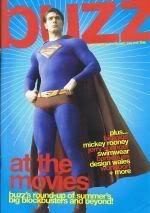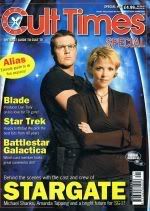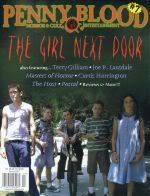Interview with Richard Siegel
Where did you get inspiration for Shadow: Dead Riot?
RS: My working title was “Damnation” – which was what the cons referred to the prison as. I wanted a super badass bogeyman, compelled by elder dark gods (ala Lovecraft) to free them from their otherworldly imprisonment. Producer Carl Morano gave me a lot of latitude in developing a story from the horror elements that he and executive producer John Sirabella wanted in the film. Shadow (aka Edward Marquis aka Mustapha Jones) was to be the anti-Superman, and since I’d already spoken to Tony Todd about it, I tailored it in part for him. Shadow was to be much like the original pulp/radio Shadow: a living shadow - literally - much in the tradition of German expressionism.
Shadow’s back-story made up the first act of my early drafts. A comic book adaptation, which I scripted, was to be the secret origin of Shadow – basically, what led him to the dark side, clarifying and embellishing things that were only hinted at in the final film. Sadly, the comic was cancelled after two issues. Well, there’s always the chance of a prequel, which I’d love to do. Basically, Shadow is an evil Superman with all the powers of darkness, living in the shadows. His master was Ny’arlath the Undying. His original name was “He Who Walks With Shadows” but that’s a mouthful!
By combining two exploitation genres of the 1970s, when I added super-heroes to the mix, I added the last of the great triple features - kung fu! I’ve always said that Shadow: Dead Riot was like a triple bill on the Deuce (42nd Street) circa 1975!!!
What did Solitaire do, anyway?
RS: Originally, Solitaire grew up in an orphanage after the brutal rape and death of her mother by persons unknown (Shadow). She killed the wrong man searching for her mother’s murderer in one version. I wrote Solitaire as having her powers from the beginning. Of course as she grew older, they intensified. One draft even had the obligatory ‘training montage” of every kung fu film. The kung fu fights were actually scripted by me blow-by-blow and the stunt choreographers were very faithful to the spirit of that.
Is it problematic having a heroine who's so obviously flawed? The prison/"rehabilitation facility" the film is set in is fairly unusual – why did you set it there?
RS: The producers requested a lot of key elements, but mostly: zombies in a women’s prison. In fact, the reason I was hired to develop the story and screenplay (through 10 unofficial drafts/3 official ones) was that my scenario made “sense of senseless killings” (quoting Lois Lane from Superman: The Movie). I think the fact that Solitaire’s far from perfect makes her more accessible to the audience, who’re far from perfect themselves. We like our gods flawed, like ourselves.
(By the way, contrary to what my esteemed co-scenarist later wrote, Solitaire is her name - not Cassandra - at least in my book!)
How did you get Tony Todd involved? Was the role written with him in mind?
RS: Tony and I had worked on the same film although we hadn’t met. I contacted him initially through our mutual friend, director Tom Whitus. At a certain point, the drafts were tailored to his inimitable personality. I never made it to visit on set and I’ve been too busy to attend conventions so I still haven’t actually met Tony face to face! How happy were you with some of the other casting choices?
Early on, I suggested some of the B-indie stalwarts like Misty and Ruby LaRocca. I was involved in casting in New York prior to Derek Wan’s involvement. I liked Meth’s performance a lot. She did a great job and Carla Greene did a fine job considering she was cast a week before principal photography began. I told her briefly via phone (or e-mail) that she was playing Supergirl (with an edge) by way of Pam Grier.
P.S. The warden’s name, Lindsay Danvers, is a nod to Lindsay Wagner and Linda Lee Danvers (Supergirl’s secret identity), and Dr. Swann is a nod to long-time Superman artist, Curt Swan. Lots of comics references were lost in translation, as they say. When I became the "writer off- project" who wasn’t directing, nobody gave a shat what I thought beyond a certain point.
You're a man of many talents – writer, cinematographer, novelist, illustrator, journalist, producer, director, radio actor – is there anything you WOULDN'T do?
RS: I have no interest in porn. It’s all rather mechanical and unimaginative. Steroid freaks and inflatable dolls grinding away in fleshy hideousness don’t excite me in the least. And I’m having doubts about the sado-masochistic nature of modern horror films – I’d prefer to be entertained and thrilled by a good story and characters that I care about rather than people sawing their feet off in torture gardens. Snuff films are very much like porno in their repetitive nature of several false climaxes before the final payoff.
Who are your idols/role models in the business?
RS: Orson Welles, Stanley Kubrick, Jerry Siegel and Joe Shuster, Walt Disney, Ray Harryhausen, Walter Gibson, Edgar Rice Burroughs, Jack "King" Kirby, Will Eisner, and Merian C. Cooper, Howard Hawks, Buster Keaton, Fellini, Val Lewton, James Whale among others. You know, the originators, the guys that lived the dream - not the following generations of copy cats that rationalize “hand me down” concepts with “homage”.
What are you working on next?
RS: I’m developing some super-secret projects - several involving characters that I created that have appeared in the pages of Weekly World News magazine. A sci-fi serial “Smash Moron, Intergalactic Dolt” which I wrote, produced and directed should be available to subscribers worldwide via cellphone providers this summer. Hopefully, they’ll want more…
IMDB link










No comments:
Post a Comment